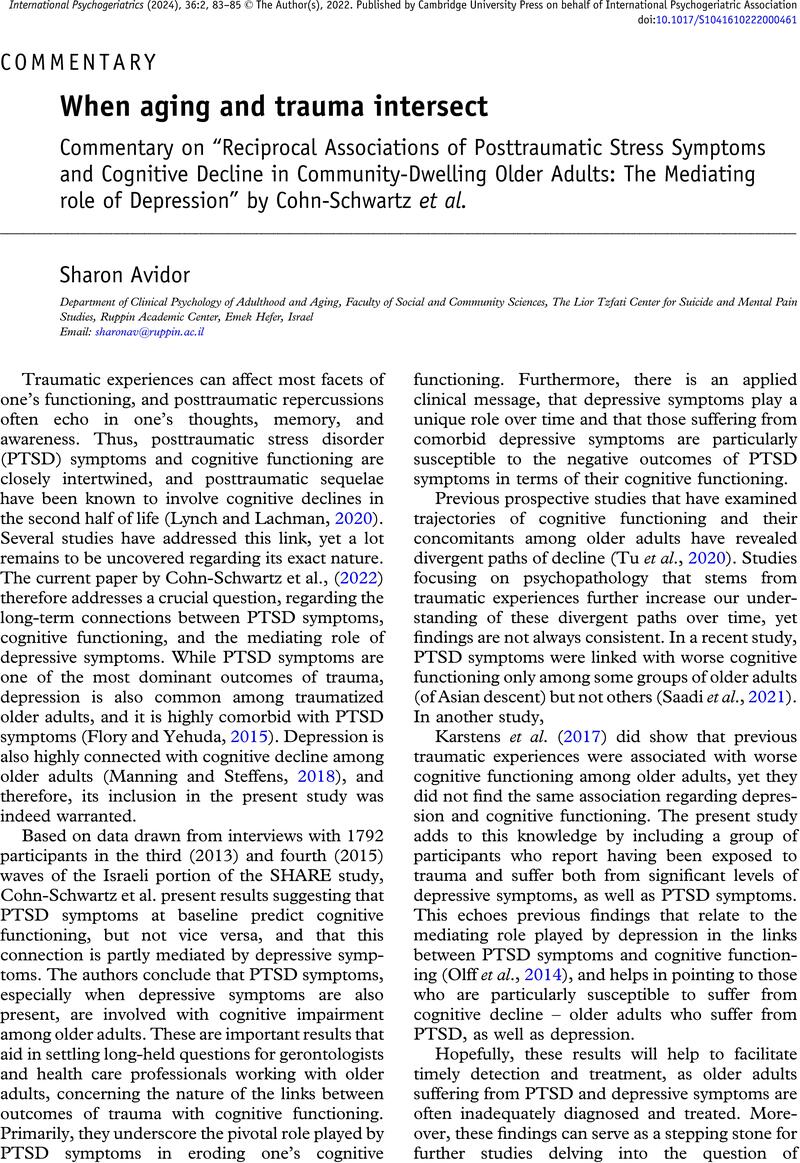No CrossRef data available.
Article contents
When aging and trauma intersect
Commentary on “Reciprocal Associations of Posttraumatic Stress Symptoms and Cognitive Decline in Community-Dwelling Older Adults: The Mediating role of Depression” by Cohn-Schwartz et al.
Published online by Cambridge University Press: 11 May 2022
Abstract
An abstract is not available for this content so a preview has been provided. Please use the Get access link above for information on how to access this content.

- Type
- Commentary
- Information
- International Psychogeriatrics , Volume 36 , Special Issue 2: Issue Theme: Psycho-Bio-Social Risk Factors and Dementia , February 2024 , pp. 83 - 85
- Copyright
- © The Author(s), 2022. Published by Cambridge University Press on behalf of International Psychogeriatric Association
References
Aloni, R. et al. (2021). Premature aging among trauma survivors—The longitudinal implications of sleep disruptions on telomere length and cognitive performance. The Journals of Gerontology: Series B, 76, 262–272. DOI 10.1093/geronb/gbz077.CrossRefGoogle ScholarPubMed
American Psychiatric Association (2013). Diagnostic and statistical manual of mental disorders: DSM-5. 5th edition, Washington, DC: American Psychiatric Publishing.Google Scholar
Brewin, C. R., Andrews, B. and Valentine, J. D. (2000). Meta-analysis of risk factors for posttraumatic stress disorder in trauma-exposed adults. Journal of Consulting and Clinical Psychology, 68, 748–766. DOI 10.1037/0022-006X.68.5.748.CrossRefGoogle ScholarPubMed
Castro-Vale, I. et al. (2019). Intergenerational transmission of war-related trauma assessed 40 years after exposure. Annals of General Psychiatry, 18, 14. DOI 10.1186/s12991-019-0238-2.CrossRefGoogle ScholarPubMed
Cohn-Schwartz, Hoffman, and Shrira (2022). Reciprocal Associations of Post-Traumatic Stress Symptoms and Cognitive Decline in Community-Dwelling Older Adults: The Mediating role of Depression, Manuscript accepted for publication with International Psychogeriatrics, IPG-08-21-431.R1.Google Scholar
Flory, J. D. and Yehuda, R. (2015). Comorbidity between post-traumatic stress disorder and major depressive disorder: alternative explanations and treatment considerations. Dialogues in Clinical Neuroscience, 17, 141–150. DOI 10.31887/DCNS.2015.17.2/jflory.CrossRefGoogle ScholarPubMed
Jakel, R. J. (2018). Posttraumatic stress disorder in the elderly. The Psychiatric Clinics of North America, 41,
165–175. DOI 10.1016/j.psc.2017.10.013.CrossRefGoogle ScholarPubMed
Karatzias, T. and Cloitre, M. (2019). Treating adults with complex posttraumatic stress disorder using a modular approach to treatment: rationale, evidence, and directions for future research. Journal of Traumatic Stress, 32, 870–876. DOI 10.1002/jts22457.CrossRefGoogle ScholarPubMed
Karstens, A. J. et al. (2017). Investigating the separate and interactive associations of trauma and depression on brain structure: implications for cognition and aging. International Journal of Geriatric Psychiatry, 32, 1190–1199. DOI 10.1002/gps.4755.CrossRefGoogle ScholarPubMed
Lahav, Y., Talmon, A., Ginzburg, K. and Spiegel, D. (2019). Reenacting past abuse-identification with the aggressor and sexual revictimization. Journal of Trauma & Dissociation, 20, 378–391.CrossRefGoogle ScholarPubMed
Lynch, K. S. and Lachman, M. E. (2020). The effects of lifetime trauma exposure on cognitive functioning in midlife. Journal of Traumatic Stress, 33, 773–782. DOI 10.1002/jts.22522.CrossRefGoogle ScholarPubMed
Manning, K. J. and Steffens, D. C. (2018). State of the science of neural systems in late-life depression: impact on clinical presentation and treatment outcome. Journal of the American Geriatrics Society 66, Suppl 1, S17–S23. DOI 10.1111/jgs.15353.CrossRefGoogle ScholarPubMed
Meltzer-Brody, S., Churchill, E. and Davidson, J. R. T. (1999). Derivation of the SPAN, a brief diagnostic screening test for post-traumatic stress disorder. Psychiatry Research, 88, 63–70. DOI 10.1016/S0165-1781(99)00070-0.CrossRefGoogle Scholar
Olff, M., Polak, A. R., Witteveen, A. B. and Denys, D. (2014). Executive function in posttraumatic stress disorder (PTSD) and the influence of comorbid depression. Neurobiology of Learning and Memory, 112, 114–121. DOI 10.1016/j.nlm.2014.01.003.CrossRefGoogle ScholarPubMed
Palgi, Y. (2015). Predictors of the new criteria for probable PTSD among older adults. Psychiatry Research, 230, 777–782. DOI 10.1016/j.psychres.2015.11.006.CrossRefGoogle ScholarPubMed
Palgi, Y., Shrira, A. and Shmotkin, D. (2015). Aging with trauma across the lifetime and experiencing trauma in old age: Vulnerability and resilience intertwined’. In: Cherry, K. E. (Eds.), Traumatic stress and long-term recovery: Coping with disasters and other negative life events (pp 293–308), Springer International Publishing.CrossRefGoogle Scholar
Saadi, A., Cruz-Gonzalez, M., Hwang, A., Cohen, L. and Alegria, M. (2021). Associations between trauma, sleep, and cognitive impairment among latino and asian older adults. Journal of the American Geriatrics Society, 69, 1019–1026. DOI 10.1111/jgs.16986.CrossRefGoogle ScholarPubMed
Solomon, Z. et al. (2017). The implications of war captivity and long-term psychopathology trajectories for telomere length. Psychoneuroendocrinology, 81, 122–128. DOI 10.1016/j.psyneuen.2017.04.004.CrossRefGoogle ScholarPubMed
Tu, L. et al. (2020). Trajectories of cognitive function and their determinants in older people: 12 years of follow-up in the chinese longitudinal healthy longevity survey. International Psychogeriatrics, 32, 765–775. DOI 10.1017/S104161022000053.CrossRefGoogle ScholarPubMed
Weinstein, G. et al. (2021). Holocaust exposure and late-life cognitive performance in men with coronary heart disease. Journal of Psychiatric Research, 134, 1–7. DOI 10.1016/j.jpsychires.2020.12.044.CrossRefGoogle ScholarPubMed


